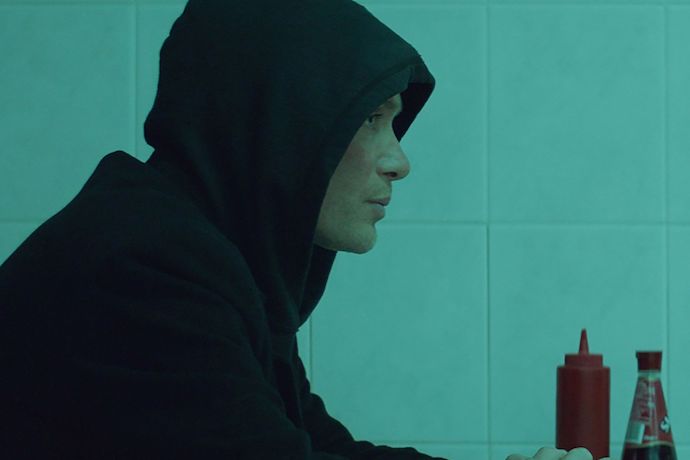
By Ruby Cooper
Walking into the auditorium at Aviva Studios, I was met with a screen showing six words: ‘I came out here to apologise’. This haunting message set the tone for the evening ahead, which, in addition to a film, included musical performances inspired by it, as well as a Q&A.
Created over three days during the pandemic, Cillian Murphy’s and Max Porter’s short film All of This Unreal Time is a daring and multifaceted exploration of grief, guilt and human connection at a time when the future of humanity was uncertain. Its themes, revealing aspects of our society we may have forgotten, are still as relevant as ever, with its meditations on the human condition resonating with the turmoil the world has been feeling since those years of lockdown. Cillian Murphy’s ‘Everyman’ embarks on a nocturnal journey through rain-soaked streets, hollow cityscapes and vast fields, confronting his deepest regrets through a series of confessions.
- Read: Music inspired by film | 5 of the best albums
- Read: Who are Punchdrunk? Our guide to the visionary immersive theatre company
We learn of the ways humanity has failed—not only each other but also the planet—mirroring our collective disconnection, selfishness and yearning for redemption. Sometimes, it is hard to recognise the shift in consciousness the world experienced after the pandemic, but I believe the film’s ambiguity and emotional impact captured it. It left me disorientated and perhaps frustrated at the lack of coherence and clarity within the experience of watching, but upon reflection, it is what living in the 2020s has felt like thus far.
- Read: Films inspired by paintings | 5 of the best
- Read: Review of ARK: United States V | a show encapsulating 21st century anxieties about ecosystem collapse
The lights were brought up as the writer, Max Porter, and producer, Mary Hickson, were brought on stage for a Q&A. Much of the discussion was concerned with the dialogue within the film and how its musicality was essential in creating the sensory experience they wanted to impose on the viewer. They explained that its ranting, essayistic quality was a purposeful choice and very different from how Porter imagined it when he wrote the script.
This sparked a lively discussion about the film’s elusive message. Porter and Hickson agreed that the film is meant to resist a singular interpretation, with Porter noting that even Cillian Murphy himself avoids confirming theories, instead turning the question back with a simple, ‘What do you think?’
- Watch: Marin Alsop on orchestral scenes from films and TV
- Read: 5 pieces of classical music inspired by paintings
One meaning, however, was unmistakable: the visual allusions to the climate crisis. Director Aoife McArdle’s deliberate contrast between the cityscapes of capitalistic loneliness and the various bugs brought into focus spoke volumes. A moth against the electronic light in the diner was transformed into a poignant question of human disruption to the natural order. We learnt that McArdle emphasised the presence of nature to question: if we find space to reckon with our own failings, shouldn’t we also make room for the grievances of the planet?
- Read: Review of Sky Burial | a multimedia take on Fauré’s Requiem
- Read: Preview of The Nutcracker and I | a new, multimedia take on the Christmas classic
In the evening’s final segment, the composers of the original score of All of This Unreal Time, Aaron and Bryce Dessner and Jon Hopkins, took their place on stage, performing new music inspired by the film. Amidst blue lights, the big screen now projected the words: ‘The whole distance is impassable.’
What started out as a slow melodic guitar over strings, a symbol of the list of apologies, turned into a spacious, spiralling, layered composition. It became angrier, representing the chaos of unknowing, of not having all the answers. Hopkin’s piano brought the piece to its last phase, transitioning back to the serenity of the field shown in the film’s final moments.
- Read: Things to do in Manchester | 5 interdisciplinary events in 2025
- Read: Music inspired by theatre | 5 of the best pieces
Max Porter re-entered the stage and recited some spoken-word he wrote especially for the event, which he explained was meant to be a “generational response” to All of this Unreal Time. It had his distinctive, evocative imagery, which felt profoundly personal but also universally resonant, leaving us with the words: “Music and water become one another, and play.” I was left hopeful for a liberating future where our self-awareness and interconnectivity produce change for good.
All of This Unreal Time resists easy categorisation. Is it a film, a poem, a piece of performance art? Perhaps, as Porter suggested, it is all these things and more. As a result, I was left with more questions than answers. What remained clear, however, was the power with which it asked us to grapple with our shared humanity, to find gratitude in the everyday wrestling of grief and guilt, and urged us to do more. It was a deeply moving and singular experience, able to speak in a way I have never experienced before. ![]()